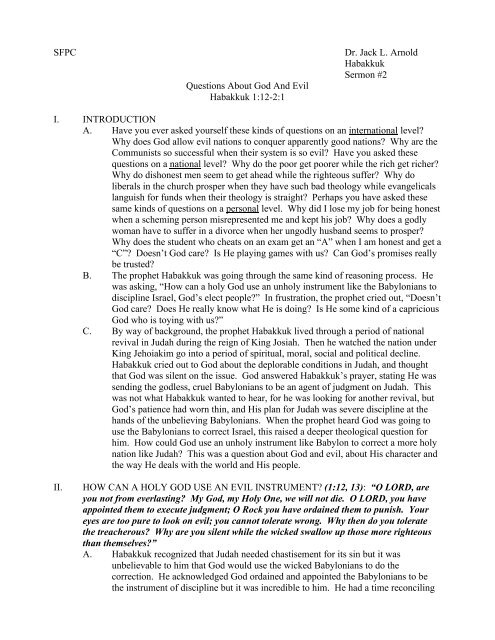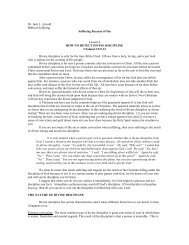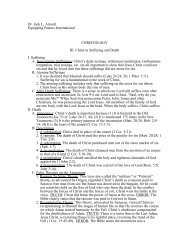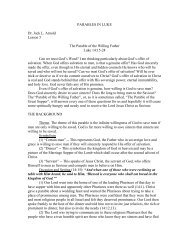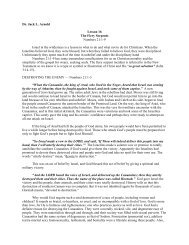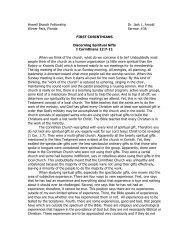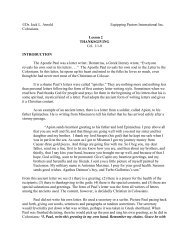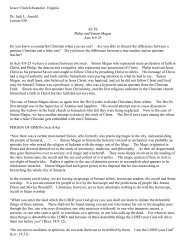SFPC Dr. Jack L. Arnold Habakkuk Sermon #2 ... - Clear Theology
SFPC Dr. Jack L. Arnold Habakkuk Sermon #2 ... - Clear Theology
SFPC Dr. Jack L. Arnold Habakkuk Sermon #2 ... - Clear Theology
Create successful ePaper yourself
Turn your PDF publications into a flip-book with our unique Google optimized e-Paper software.
<strong>SFPC</strong> <strong>Dr</strong>. <strong>Jack</strong> L. <strong>Arnold</strong><br />
<strong>Habakkuk</strong><br />
<strong>Sermon</strong> <strong>#2</strong><br />
Questions About God And Evil<br />
<strong>Habakkuk</strong> 1:12-2:1<br />
I. INTRODUCTION<br />
A. Have you ever asked yourself these kinds of questions on an international level?<br />
Why does God allow evil nations to conquer apparently good nations? Why are the<br />
Communists so successful when their system is so evil? Have you asked these<br />
questions on a national level? Why do the poor get poorer while the rich get richer?<br />
Why do dishonest men seem to get ahead while the righteous suffer? Why do<br />
liberals in the church prosper when they have such bad theology while evangelicals<br />
languish for funds when their theology is straight? Perhaps you have asked these<br />
same kinds of questions on a personal level. Why did I lose my job for being honest<br />
when a scheming person misrepresented me and kept his job? Why does a godly<br />
woman have to suffer in a divorce when her ungodly husband seems to prosper?<br />
Why does the student who cheats on an exam get an “A” when I am honest and get a<br />
“C”? Doesn’t God care? Is He playing games with us? Can God’s promises really<br />
be trusted?<br />
B. The prophet <strong>Habakkuk</strong> was going through the same kind of reasoning process. He<br />
was asking, “How can a holy God use an unholy instrument like the Babylonians to<br />
discipline Israel, God’s elect people?” In frustration, the prophet cried out, “Doesn’t<br />
God care? Does He really know what He is doing? Is He some kind of a capricious<br />
God who is toying with us?”<br />
C. By way of background, the prophet <strong>Habakkuk</strong> lived through a period of national<br />
revival in Judah during the reign of King Josiah. Then he watched the nation under<br />
King Jehoiakim go into a period of spiritual, moral, social and political decline.<br />
<strong>Habakkuk</strong> cried out to God about the deplorable conditions in Judah, and thought<br />
that God was silent on the issue. God answered <strong>Habakkuk</strong>’s prayer, stating He was<br />
sending the godless, cruel Babylonians to be an agent of judgment on Judah. This<br />
was not what <strong>Habakkuk</strong> wanted to hear, for he was looking for another revival, but<br />
God’s patience had worn thin, and His plan for Judah was severe discipline at the<br />
hands of the unbelieving Babylonians. When the prophet heard God was going to<br />
use the Babylonians to correct Israel, this raised a deeper theological question for<br />
him. How could God use an unholy instrument like Babylon to correct a more holy<br />
nation like Judah? This was a question about God and evil, about His character and<br />
the way He deals with the world and His people.<br />
II. HOW CAN A HOLY GOD USE AN EVIL INSTRUMENT? (1:12, 13): “O LORD, are<br />
you not from everlasting? My God, my Holy One, we will not die. O LORD, you have<br />
appointed them to execute judgment; O Rock you have ordained them to punish. Your<br />
eyes are too pure to look on evil; you cannot tolerate wrong. Why then do you tolerate<br />
the treacherous? Why are you silent while the wicked swallow up those more righteous<br />
than themselves?”<br />
A. <strong>Habakkuk</strong> recognized that Judah needed chastisement for its sin but it was<br />
unbelievable to him that God would use the wicked Babylonians to do the<br />
correction. He acknowledged God ordained and appointed the Babylonians to be<br />
the instrument of discipline but it was incredible to him. He had a time reconciling
God’s actions with God’s moral standards. God was holy and could not tolerate<br />
wrong or even look on evil. Yet, He would use Babylon, a less righteous nation, to<br />
punish Judah, a more righteous nation. With all its failures, Israel was more<br />
righteous than Babylon. NOTE: This would be comparable to true believers in<br />
Christ in America crying out to God about the visible church in this country – its<br />
liberalism, its smugness, its pride, its wealth, its indifference, its coldness, its lack of<br />
concern for the lost, its lack of concern for the poor, its slavish commitment to<br />
tradition, its lack of Bible preaching, its self-righteous legalism, its tolerance of<br />
sexual immorality and a hundred other negative factors. We pray for God to bring<br />
revival and expect it. But what if God would give the answer that He is going to<br />
destroy the organized church in America by an invasion of the Communists. Would<br />
we not begin to argue with God because this doesn’t seem right? The church may<br />
be in a deplorable state but it does not seem right that America and the organized,<br />
visible church in it should be destroyed by an utterly godless system like<br />
Communism. We would begin to say, “Why do you tolerate the wrong? Why do<br />
you allow the wicked to swallow up those more righteous than themselves?”<br />
NOTE: We pray God will bring revival to the church in America, but God may<br />
choose to destroy America because of its wickedness. God expects more from<br />
America because America has had much more light than any nation in the world.<br />
An invasion would mean the destruction of the organized church but not the<br />
destruction of the true church. The true church would continue to survive as it does<br />
in Communist countries today. It would be tough. It would be almost unbearable<br />
(and we should do all we can to avoid it) but if it comes, the church will continue.<br />
In fact, in some ways it will grow stronger because the dead wood in the church will<br />
be flushed out. The church in America today is large, rich and powerful, but if we<br />
are disciplined, the church will grow smaller, poorer and stronger.<br />
ILLUSTRATION: Two Lutheran pastors in East Germany.<br />
B. In <strong>Habakkuk</strong>’s complaint, he never denies the existence of God. He knows God is<br />
real. He just doesn’t understand His methods. Notice carefully, the prophet affirms<br />
his faith in God. He says, “O LORD, are you not from everlasting?” He is not<br />
complaining out of unbelief but belief. NOTE: What a contrast with the wicked<br />
Babylonians. In 1:11, it says of the Babylonians, “whose own strength is their<br />
god.” They rejoiced in their might. They trusted in their armed forces. Their god<br />
was their own strength. However, the strength of <strong>Habakkuk</strong> and the believing<br />
remnant in Israel was Jehovah-God. The prophet believed in a supernatural working<br />
God. He questioned why God wasn’t working but did not question His existence.<br />
The prophet knew to depend on one’s own strength, to depend on one’s own talents,<br />
skills, bank rolls, or armies was foolishness. The only hope of the nation was total<br />
dependence on God. Woe to the nation which trusts in their armed forces, their<br />
nuclear power, their star wars system or whatever. If they forget God, they are<br />
destined for disappointment. Woe be to that individual or nation which says, “I am<br />
master of my fate. I am the captain of my soul!”<br />
C. <strong>Habakkuk</strong> turned to God. Even though he did not understand, he turned to God in<br />
faith. He acknowledged God as the Self-existent One, for he says, “O LORD” (O<br />
Jehovah). Jehovah is absolutely independent of men and everything outside of<br />
Himself. He acknowledges God as the Everlasting One, for he says, “My God” (my<br />
Eloheim); that is , the Creator who is strong to do the impossible. He acknowledges<br />
God as the Holy One; that is, the one who is separate from all, totally able to back<br />
up His promises with His holy character. He acknowledges Him as the “Rock” or<br />
2
Stable One because He is a stable God who never changes and is true to His<br />
promises. He cannot be moved from His Word. He acknowledges God as the<br />
Faithful One because he says, “We shall not die.” <strong>Habakkuk</strong> knew his Old<br />
Testament and understood God had entered into covenant with Israel, promising<br />
they would be a people forever. Over and over again, God said, “I will be their God<br />
and they shall be my people.” Jehovah-God was as close to the people of God as<br />
His covenant with them. Even if He disciplined them, He would be faithful to them.<br />
He was a faithful God. He gave His Word and He would not break it. They would<br />
not die. They would not cease to exist as a nation no matter what the Babylonians<br />
might do to them. ILLUSTRATION: Charles Spurgeon tells the story of a woman<br />
who was in a discussion over the assurance of salvation with one of her neighbors.<br />
The neighbor was a very skeptical man and loved to poke fun at her. Finally, one<br />
day when she had spoken on eternal security and how she belonged to the Lord –<br />
her future being totally in God’s hands – he said to her, “How do you know that?”<br />
She said, “God tells me that a hundred times in His Word,” and she started quoting<br />
verses to him. Finally, he said, “Suppose God doesn’t keep His Word?” she<br />
quickly answered, “His loss would be greater than mine. I would lose my soul,<br />
that’s true, but God would lose His honor.” Behind the promises of God stands the<br />
character of God.<br />
III. HOW CAN GOD PERMIT WICKED ONES TO CAPTURE RIGHTEOUS ONES? (1:14,<br />
15): “You have made men like fish in the sea, like sea creatures that have no ruler. The<br />
wicked foe pulls all of them up with hooks, he catches them in his net, he gathers them up<br />
in his dragnet; and so he rejoices and is glad.”<br />
A. Judah was like fish, helpless, defenseless, easy prey for the Babylonians, and the<br />
prophet wants to know why God would allow His elect people, who are more<br />
righteous than the Babylonians, to go into captivity. It did not seem fair. It seemed<br />
inconsistent with the holy character of God.<br />
B. Historically, the Babylonians literally put hooks in the jaws of their captives and<br />
dragged them off to Babylon to be slaves. What a ruthless people these Babylonians<br />
were! One of the symbols of the Babylonians depicting their great victories was a<br />
dragnet. All the major Babylonian deities (Ningirus, Shamash, Enlil and Marduk)<br />
are pictured holding or dragging a net in which the captured enemies squirm<br />
helplessly.<br />
IV. HOW CAN GOD ALLOW THE WICKED TO GLORIFY THEMSELVES? (1:16, 17):<br />
“Therefore he sacrifices to his net and burns incense to his dragnet, for by his net he<br />
lives in luxury and enjoys the choicest food. Is he to keep on emptying his net, destroying<br />
nations without mercy?”<br />
A. It was an ancient custom to sacrifice to the means which made something possible.<br />
For instance, the Sythians made their swords symbols of Mars and sacrificed to their<br />
swords. The sword being the strength and means to victory. The Babylonians<br />
sacrificed to their dragnets which were symbolic of sovereign power, pulling in<br />
enemies like defenseless fish. They praised their dragnets as their god. In essence,<br />
they were sacrificing to their own might, power and strength. They were glorifying<br />
themselves. If God allowed this to go on, people might conclude the Babylonian<br />
gods were more powerful than Jehovah-God. Then they would receive glory rather<br />
than the true God. But how can this be when God said, “I will not give (yield,<br />
share) my glory with another” (Isa. 48:11)? The Babylonians claim to self-deity<br />
3
appeared to be robbing God of glory. God didn’t seem to be doing anything about<br />
it.<br />
B. <strong>Habakkuk</strong>, while trusting God, was frustrated, confused, disturbed and maybe a<br />
little disgusted with the methods of God. He didn’t understand and he wanted an<br />
answer to this spiritual problem.<br />
V. THE PROPHET SEEKS AN ANSWER (2:1): “I will stand at my watch and station<br />
myself on the ramparts; I will look to see what he will say to me, and what answer I am<br />
going to give to this complaint.”<br />
A. The prophet wants an answer so he goes off to pray. He may have gone to a fortress<br />
with a military watch-tower to pray, but most commentators take this to be symbolic<br />
language. The point is that <strong>Habakkuk</strong> got off by himself and waited for God to give<br />
him an answer to prayer. He got away from the mundane affairs of being a prophet<br />
to seek an answer from God. NOTE: We all need daily to get off with God alone to<br />
read, meditate and pray. Sometimes we need to take a half-day or two or three days<br />
or longer to be alone with God. Sometimes we need to fast as well as pray. In<br />
solitude, God can speak to us through His Word better than when we are caught up<br />
in a flurry of activities. It seems as though in twentieth century America, we have<br />
gotten away from the art of being alone with God.<br />
B. <strong>Habakkuk</strong> had a strong motivation to pray. As a prophet, he had to tell Israel what<br />
God’s answer to his complaint was. He had questioned God’s justice and needs an<br />
answer for the people and for himself.<br />
VI. STEPS TO SOLVING SPIRITUAL PROBLEMS<br />
A. <strong>Habakkuk</strong> went through a Biblical problem solving process. When we have<br />
problems, it is important that we too follow this process. However, not all people<br />
do. Sometimes when things go wrong, people withdraw. They drop out of church<br />
and Christian activities and say, “God doesn’t care. He has been mean to me. He<br />
hasn’t done what I wanted Him to do.” Others, when things go wrong, repudiate<br />
their past beliefs about God. They say, “God is dead. My former beliefs about God<br />
were wrong. Disregard anything I have previously said about God.” Still others<br />
stay in church and sulk. They take their anger against God out on the preacher or<br />
the Session or the congregation. But there is a right way to solve spiritual problems.<br />
B. Recognition. Acknowledge your doubt. Face up to the fact you have a problem.<br />
Don’t rationalize your situation. Get whatever is bothering you out on the table.<br />
<strong>Habakkuk</strong> got his problem out in the open. He said, “Why do you tolerate the<br />
treacherous? Why are you silent while the wicked swallow up those more<br />
righteous than themselves?” The prophet was not timid. He acknowledged the<br />
problem.<br />
C. Meditation. Think honestly about the problem. Don’t panic. Don’t get upset.<br />
Don’t start talking to everyone. Think through the problem. <strong>Habakkuk</strong> was<br />
thinking through his problems as he brought his complaints to God. The Bible says<br />
in James 1:19 that we should be “quick to listen and slow to speak.” When we get<br />
quiet and think, we begin to sort things out and allow God to shed some light on the<br />
situation.<br />
D. Reflection. Remind yourself of who God is. When we have a problem, we must<br />
remember who God is and how powerful He is to solve the problem. We go back to<br />
the basics of the attributes of God. <strong>Habakkuk</strong>, in all of his confusion, went right<br />
back to God saying, “You are the Self-existent One. You are the Strong One. You<br />
4
are the Everlasting One. You are the Holy One. You are the Faithful One who<br />
keeps His promises.” He reminded himself that God is sovereign, omnipotent and<br />
immutable. He is independent of history. He preceded history. He created history.<br />
His throne is outside of time and space. God is in control of everything. Therefore,<br />
He is in control of my particular problem.<br />
E. Action. Commit the problem to the Lord. <strong>Habakkuk</strong> got off alone with the Lord<br />
and committed the whole situation to Him in prayer. In solving problems, we must<br />
give the problem to the Lord not depending on anyone or anything. We must not<br />
give the problem over to a friend, thinking that a friend has more answers than God.<br />
We must not give the problem over to the Lord and take it back again, continuing to<br />
worry about it. If we do that we just as well never have prayed in the first place.<br />
We must not give the problem to the Lord and then continue to scheme on our own<br />
to get it accomplished. Once we have taken our problem to the Lord, we should<br />
cease to concern ourselves about it. We should turn our backs on it and center our<br />
attention on God for an answer. ILLUSTRATION: It is so easy to scheme when<br />
we are trying to find God’s will for our lives. We are all guilty of doing it from time<br />
to time. We are so often like the pastor and his wife who were candidating for one<br />
of the largest local churches in the state. They finally got word from the church that<br />
they were accepted. The pastor said to his wife, “Honey, you go upstairs and pack<br />
while I stay down here and pray whether it is God’s will for us to accept this<br />
church.”<br />
F. Relaxation. Wait upon the Lord. It is not enough to pray, to think, to commit, and<br />
to cast our burden on the Lord. We must also wait. We must wait patiently for God<br />
to give us an answer, and He will. It may not be the answer we want but it will be<br />
the one God wants and that is what is best for us in the long run. As we wait, we<br />
must anticipate God will answer. In fact, we may even thank Him for the answer<br />
before we have it. <strong>Habakkuk</strong> went away and patiently waited for God to give an<br />
answer to his complaint. ILLUSTRATION: Anticipating God’s answer to prayer<br />
reminds me of a story. There was this cranky little old lady who was not invited to<br />
the church picnic. There had been an oversight. On the day of the picnic, the<br />
church realized that this lady had been overlooked. So they sent a young man over<br />
to her house to invite her to the picnic and bring her to the fun and festivities. She<br />
said to the young man, “It’s too late. I’ve already prayed for rain.” Now that is<br />
faith! That is true anticipation!<br />
VI. CONCLUSION<br />
A. Saved. What lessons does God want the Christian to learn from this section of<br />
Scripture? First, God is our strength and we are not to trust in the arm of the flesh as<br />
did the Babylonians. Second, only God has the real answers to our spiritual<br />
problems; therefore, we must go to Him for the answers. Third, God can use<br />
whatever instrument He wants to discipline us and that discipline is always for our<br />
own good. Fourth, we all need to get alone with God so He can speak to us through<br />
His Word and prayer. Fifth, where reason ends, faith begins. Sixth, waiting on God<br />
to answer our prayers is the most difficult thing for a Christian to do, but when we<br />
learn how to wait, we unlock the door to real spiritual victory.<br />
B. Unsaved.<br />
1. Are you a person who sees life as a problem? Do you sense that there is no<br />
real meaning to existence? God has an answer to your problem. The answer<br />
is Jesus Christ.<br />
5
2. Trust in Christ. Go to Christ for forgiveness of your sins. Bow to Christ as<br />
your Lord, giving Him the right to rule in your life. Then Christ will begin<br />
to unravel the mystery of life. Christ will tie you in with the Self-existent<br />
One, the Strong One, the Eternal One, the Holy One, the Stable One, the<br />
Faithful One. You will find the answers to life in Christ. Jesus said, “I am<br />
the Way, the Truth and the Life: no man comes to the Father except<br />
through Me.” (Jn. 14:6)<br />
6


